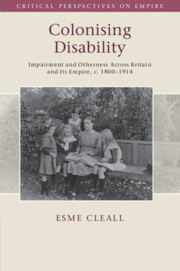Book contents
- Colonising Disability
- Critical Perspectives on Empire
- Colonising Disability
- Copyright page
- Dedication
- Contents
- Tables
- Acknowledgements
- Introduction
- 1 Disability and Otherness in the British Empire
- 2 Saving the Other at Home and Overseas
- 3 ‘A Fearfully and Wonderfully Made Individual’
- 4 Signs of Humanity
- 5 A Deaf Imaginary
- 6 Immigration
- 7 The Health of the Nation
- 8 Conclusion
- Bibliography
- Index
1 - Disability and Otherness in the British Empire
Disablement as a Discourse of Difference
Published online by Cambridge University Press: 21 July 2022
- Colonising Disability
- Critical Perspectives on Empire
- Colonising Disability
- Copyright page
- Dedication
- Contents
- Tables
- Acknowledgements
- Introduction
- 1 Disability and Otherness in the British Empire
- 2 Saving the Other at Home and Overseas
- 3 ‘A Fearfully and Wonderfully Made Individual’
- 4 Signs of Humanity
- 5 A Deaf Imaginary
- 6 Immigration
- 7 The Health of the Nation
- 8 Conclusion
- Bibliography
- Index
Summary
This chapter explores the discourses used to construct disability as different in nineteenth-century Britain and its empire. First, I argue that in this period a constellation of figures came to be seen as a class of people distinct from the remainder of the British population. The census and philanthropic literature functioned to crystallise disability as something tangible and other. Conceptualising disabled people in this way required considerable discursive, architectural, administrative, philanthropic and pedagogical work and this work occurred both in the empire overseas and at home in imperial Britain. Secondly, I argue that the status of Britain, throughout the nineteenth century, as the heart of a global empire, was crucial to how ideas about disability came to be formed. My third argument is that whilst empire shaped the way in which disability was constructed, the reverse was also true: thinking about disability moulded the way in which the colonial ‘other’ was imagined. People of colour who may otherwise be considered non-disabled were repeatedly described using language that evoked disablement. My overarching argument is, therefore, that discourses of race and disability, whilst not one and the same, were not simply related discourses but were mutually constituted.
Keywords
- Type
- Chapter
- Information
- Colonising DisabilityImpairment and Otherness Across Britain and Its Empire, c. 1800–1914, pp. 25 - 61Publisher: Cambridge University PressPrint publication year: 2022

